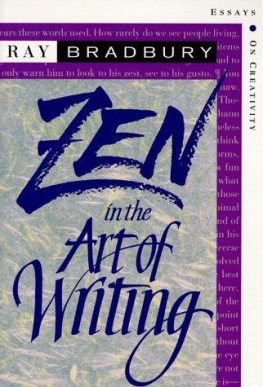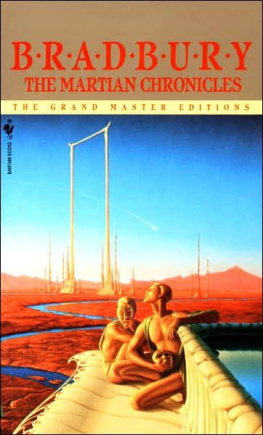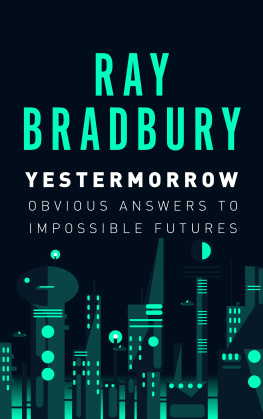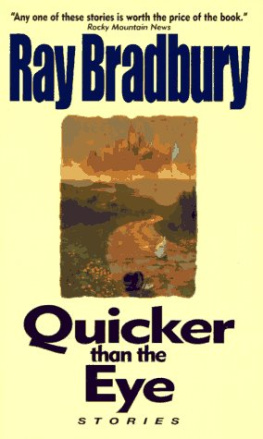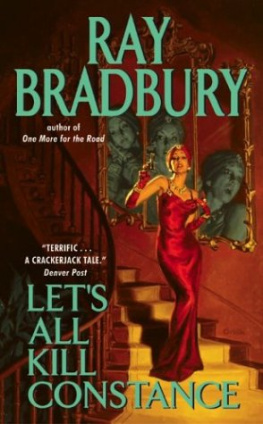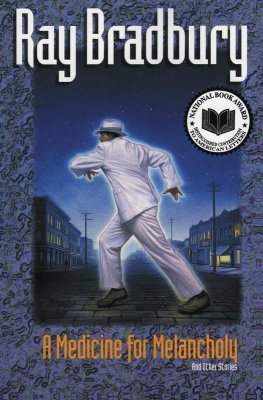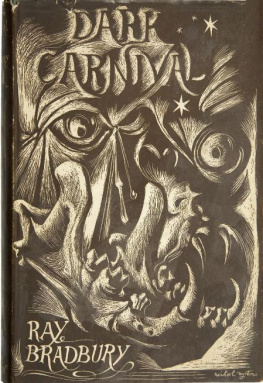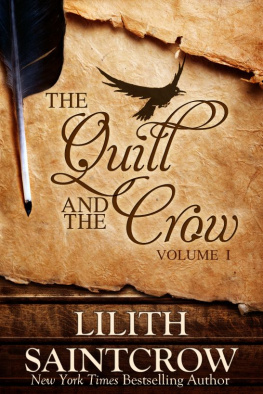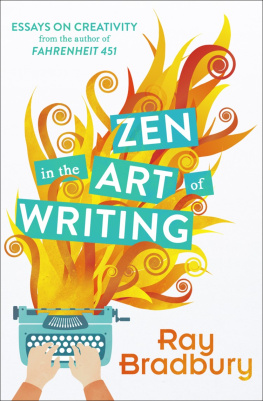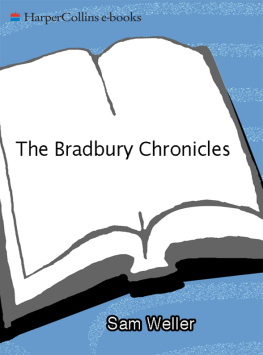
A NOTE ABOUT THE
AUTHOR
Ray Bradbury has published some twenty-seven booksnovels, stories, plays, essays, and poemssince his first story appeared when he was twenty years old. He began writing for the movies in 1952with the script for his own Beast from 20,000 Fathoms.
The next year he wrote the screenplays for It Came from OuterSpace and Moby Dick. And in 1961 he wrote Orson Welles's narration for King of Kings. Films have been made of his "The Picasso Summer," The Illustrated Man, Fahrenheit 451, The Martian Chronicles, and Something Wicked This Way Comes, and the short animated film Icarus Montgolfier Wright, based on his story of the history of flight, was nominated for an Academy Award.
Since 1985 he has adapted his stories for "The Ray Bradbury Theater" on USA Cable television.
Z E N
IN THE
ART
OF
W R I T I N G
RAY BRADBURY
JOSHUA ODELL EDITIONS
SANTA BARBARA
1996
Copyright 1994 Ray Bradbury Enterprises.
All rights reserved under International and Pan-American Copyright Conventions.
Owing to limitations of space, acknowledgments to reprint may be found on page 165.
Published by Joshua Odell Editions
Post Office Box 2158, Santa Barbara, CA 93120
Library of Congress Cataloging-in-Publication Data Bradbury, Ray, 1920
Zen in the art of writing.
1. Bradbury, Ray, 1920- Authorship.
2. Creative ability.3. Authorship. 4. Zen Buddhism.
I. Title.
PS3503. 167478 1989 808'.os 89-25381
ISBN 1-877741-09-4
Printed in the United States of America.
Designed by The Sarabande Press
TO MY FINEST TEACHER,
JENNET J O H N S O N ,
W I T H LOVE
CONTENTS
PREFACE
xi
T H E JOY OF W R I T I N G
3
RUN FAST, STAND S T I L L , OR, THE THING AT THE TOP OF THE
STAIRS, OR, NEW GHOSTS FROM OLD MINDS
13
HOW TO KEEP AND FEED A MUSE
31
DRUNK, AND IN CHARGE OF A BICYCLE
49
INVESTING DIMES: FAHRENHEIT 4 5 1
69
JUST THIS SIDE OF BYZANTIUM: DANDELION WINE
79
THE LONG ROAD TO MARS
91
ON THE SHOULDERS OF GIANTS
99
THE SECRET MIND
111
SHOOTING HAIKU IN A BARREL
125
ZEN IN THE ART OF WRITING
139
. .. O N CREATIVITY
157
HOW TO C L I M B T H E
T R E E O F L I F E , T H R O W
ROCKS AT Y O U R S E L F ,
A N D GET DOWN A G A I N
W I T H O U T B R E A K I N G
YOUR BONES OR YOUR
S P I R I T
A PREFACE W I T H A
T I T L E NOT M U C H
L O N G E R T H A N T H E
BOOK
Sometimes I am stunned at my
capacity as a nine-year-old, to understand my entrapment and escape it.
How is it that the boy I was in October, 1929, could, because of the criticism of his fourth grade schoolmates, tear up his Buck Rogers comic strips and a month later judge all of his friends idiots and rush back to collecting?
Where did that judgment and strength come from? What sort of process did I experience to enable me to say: I am as good as dead. Who is killing me? What do I suffer from? What's the cure?
I was able, obviously, to answer all of the above. I named the sickness: my tearing up the strips. I found the cure: go back to collecting, no matter what.
I did. And was made well.
But still. At that age? When we are accustomed to responding to peer pressure?
Where did I find the courage to rebel, change my life, live alone?
I don't want to over-estimate all this, but damn it, I love that nine-year-old, whoever in hell he was. Without him, I could not have survived to introduce these essays.
P R E F A C E
Part of the answer, of course, is in the fact that I was so madly in love with Buck Rogers, I could not see my love, my hero, my life, destroyed. It is almost that simple. It was like having your best all-round greatest-loving-buddy, pal, center-of-life drown or get shot-gun killed. Friends, so killed, cannot be saved from funerals. Buck Rogers, I realized, might know a second life, if I gave it to him. So I breathed in his mouth and, lo !, he sat up and talked and said, what?
Yell. Jump. Play. Out-run those sons-of-bitches. They'll never live the way you live. Go do it.
Except I never used the S.O.B. words. They were not allowed.
Heck! was about the size and strength of my outcry. Stay alive!
So I collected comics, fell in love with carnivals and World's Fairs and began to write. And what, you ask, does writing teach us?
First and foremost, it reminds us that we are alive and that it is a gift and a privilege, not a right. We must earn life once it has been awarded us. Life asks for rewards back because it has favored us with animation.
So while our art cannot, as we wish it could, save us from wars, privation, envy, greed, old age, or death, it can revitalize us amidst it all.
Secondly, writing is survival. Any art, any good work, of course, is that.
Not to write, for many of us, is to die.
We must take arms each and every day, perhaps knowing that the battle cannot be entirely won, but fight we must, if only a X I I
P R E FAC E
gentle bout. The smallest effort to win means, at the end of each day, a sort of victory. Remember that pianist who said that if he did not practice every day he would know, if he did not practice for two days, the critics would know, after three days, his audiences would know.
A variation of this is true for writers. Not that your style, whatever that is, would melt out of shape in those few days.
But what would happen is that the world would catch up with and try to sicken you. If you did not write every day, the poisons would accumulate and you would begin to die, or act crazy, or both.
You must stay drunk on writing so reality cannot destroy you.
For writing allows just the proper recipes of truth, life, reality as you are able to eat, drink, and digest without hyperventilating and flopping like a dead fish in your bed.
I have learned, on my journeys, that if I let a day go by without writing, I grow uneasy. Two days and I am in tremor. Three and I suspect lunacy. Four and I might as well be a hog, suffering the flux in a wallow. An hour's writing is tonic. I'm on my feet, running in circles, and yelling for a clean pair of spats.
So that, in one way or another, is what this book is all about.
Taking your pinch of arsenic every morn so you can survive to sunset. Another pinch at sunset so that you can more-than-survive until dawn.
The mirco-arsenic-dose swallowed here prepares you not to be poisoned and destroyed up ahead.
X I I I
P R E FAC E
Work in the midst of life is that dosage. To manipulate life, toss the bright-colored orbs up to mix with the dark ones, blending a variation of truths. We use the grand and beautiful facts of existence in order to put up with the horrors that afflict us directly in our families and friends, or through the newspapers and T.V.
The horrors are not to be denied. Who amongst us has not had a cancer-dead friend? Which family exists where some relative has not been killed or maimed by the automobile? I know of none.
In my own circle, an aunt, and uncle, and a cousin, as well as six friends, have been destroyed by the car. The list is endless and crushing if we do not creatively oppose it.
Next page
